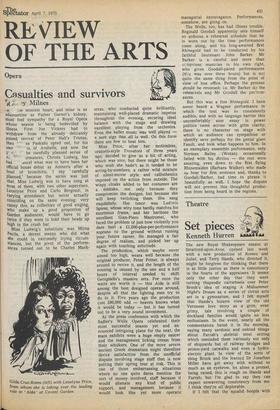Opera
Casualties and survivors
y MIInes
tae stoniest heart, and mine is as adamantine as Father Garnet's kidney, Must feel sympathy for a Royal Opera Whose season is being bedeviled by illness. First Jon Vickers had to withdraw from the already delicately Poised revival of Peter Hall's Tristan, then ' as Paskalis opted out, for his hwr is, of Arabella, and now the At " ormances, Christa Ludwig, has had .ancel what was to have been her Official house debut as Amneris after a bout of bronchitis. I say ' carefully Planned,' because the series was just that. Miss Ludwig was to have sung at most of them, with two other superstars, Leontyne Price and Carlo Bergonzi, in varying attendance but never actually coinciding on the same evening: very Canny this, as collectors of good singing, Who make up a good proportion of Garden audiences, would have to go twice if they were to hold their heads up high in the crush bar.
Miss Ludwig's substitute was Mirna Pecile, a decent mezzo who did what she could in extremely trying circumstances, but the pivot of the performances turned out to be Charles Mack erras, who conducted quite brilliantly, maintaining well-placed dramatic impetus throughout the evening, securing ideal balance with the stage and drawing excellent playing from the orchestra. Even the ballet music was well played — a sure sign that all is well. On this form there are few to beat him.
Miss Price, after her motionless, oratorio-style Trovatore of three years ago, decided to give us a bit of acting, which was nice, but there might be those who wish she hadn't as it tended to be acting-by-numbers, a rather wild mixture of silent-movie style and callisthenics imposed on the action from outside. The wispy cloaks added to her costumes are a mistake, not only because they compromise the designs, but because she will keep twitching them. She sang exquis1tely. Her tenor was Ludovic Spiess, whose wiry tone hardly matches his enormous frame, and her baritone the excellent Gian-Piero Mastromei, who faced the problem of just how violently you dare hurl a £1,000-plus-per-performance soprano to the ground without ruining your future career. He managed a fair degree of realism, and picked her up again with touching solicitude.
The production, which maybe never aimed too high, wears well because the original producer, Peter Potter, is always around to revive it, and the length of the evening is caused by the one and a half hours of interval needed to shift Georgiadis's massive sets. For once the waits are worth it — this Aida is still among the best designed operas around, despite all that the lighting men try to do to it. Five years ago the production cost E80,000 odd — heaven knows what it would be today — but it has turned out to be a very sound investment.
At the press conference with which the Sadler's Wells Opera celebrated their most successful season yet and announced intriguing plans for the next, the main exhibits were a huge empty saucer and the management licking cream from their whiskers. One of the more severe ancient Greek dramatists might therefore derive satisfaction from the unofficial dispute involving stage staff that is now putting their spring tour at risk. This is one of those embarrassing situations where no one quite dares mention the sort of money involved,. staff because it would alienate any kind of public support, and management because it would look like yet more operatic managerial extravagance. Performances, -somehow, are going on.
The Wells, too, has had illness trouble.
Reginald Goodall apparently sets himself so arduous a rehearsal schedule that he is worn out by the time performances come along, and his long-awaited first Rhinegold had to be conducted by his faithful lieutenant John Barker. Mr Barker is a careful and more than ccnips.tent musician in his own right, who gives Goodall-paced performances (thls was over three hours) but is not quite the same thing from the point of view of box office. Perhaps the process should be reversed: i.e. Mr Barker d3 the rehearsals and Mr Goodall the performances.
But this was a fine Rhinegold. I have never heard a Wagner performance in which the text was so consistently audible, and with no language barrier this uncomfortably sour essay in power politics came across with grim clarity; there is no character on stage with which an audience can sympathise or identify save perhaps for the genial giant Fasolt, and look what happens to him. In an exemplary ensemble performance, only Norman Bailey (Wotan) occasionally failed with his diction — the rest were amazing, even down to the first flying Rhinemaiden (Barbara Walker) who made US hear her first sentence and, thanks to Goodall/Barker, had time to phrase it beautifully as well. I hope the dispute will not prevent this thoughtful production from being heard in the regions.
Theatre


































 Previous page
Previous page